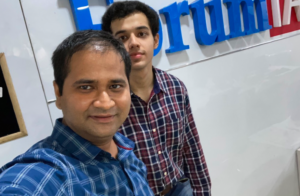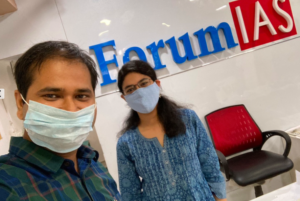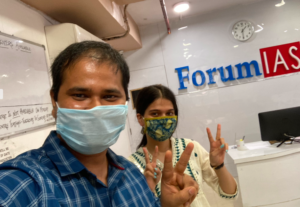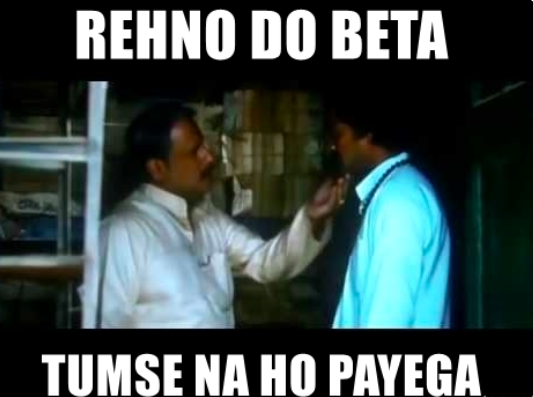ForumIAS announcing GS Foundation Program for UPSC CSE 2025-26 from 19 April. Click Here for more information.
ForumIAS Answer Writing Focus Group (AWFG) for Mains 2024 commencing from 24th June 2024. The Entrance Test for the program will be held on 28th April 2024 at 9 AM.
To know more about the program visit: https://forumias.com/blog/awfg2024
We have reached the part of our Mains preparation where we just want to write the exam any moment now.
The last week before the Mains is particularly jittery – if you are writing your first Mains.
And if it is your third Mains or more, and you have set in “this too shall pass” as your philosophy, it may be feeling better or worse depending on your mindset.
Here are some suggestions to deal with the last days before the exam.
Suggestions I wish people had before they learn it on their own.
This article was being written almost a month ago. With a lot of fresh ideas.
But a personal tragedy set me back and here we are – with a completely revised article – only with what is most important at this point.
And that is answer writing.
I also suggest a framework for ensuring a good value added answer.
Again, since this is the last week, the goal of the article is not to tell you to know more – but to make the most of what you already know.
And making the best use of what we have, is an art too – even if it is underappreciated one.
Not everyone is capable or lucky enough to realize their full potential.
People often complain of the noise when opportunity knocks at their door.
So before we begin with this long read, always remember two basic tenets of answer writing in the Mains examination.
One, you must begin to address the question as early as possible. The examiner is looking for the answer and the earlier you give it to him, the better you score.
Two, when faced with paucity of time – like 5 questions in 10 minutes – what matters is the direct answer to the question. Nothing else, no introduction and no conclusion matters. Just the answer.
Here you go.
If you are goo enough to clear Prelims, you are good enough to clear Mains too.
The Mains does not require you to know more as much as it does to articulate what you already know.
Remember that subjective questions enjoy a degree of “subjectivity” in the marking pattern no matter what ( despite the best efforts of UPSC as well as coaching institutes to make it as objective as possible ).
So whatever you write is correct. Or equally wrong. And the goal is to be “more” correct or “less” wrong than others.
So embrace what you know. Use it as a weapon.
You may be having a good preparation or an unsatisfactory one.
But the examiner does not know that.
All the examiner knows about you is through the answers you write for him/ her. And if you do a good job at that, the examiner is bound to award you marks.
Here is an argument.
I used to meet people nearing the end of their preparation usually.
This year, however, we have been lucky to meet younger people – the ones in early 20s with a head full of hair ( and the enthusiasm to study even after the Mains is over ).
( This year, we had a lot of first attempters, 21-year-olds types, clearing the Civils Examination in one go. These folks secured ranks 21, 28 and 51 in CSE 2019. Picture from happier times. )
One such kid this year was Piyush. The TFH dude told me that having a framework helps.
Whenever faced with writing an answer, try to follow this framework. I call it he BAKES framework. ( Since cooking is a hobby ) . You can choose your own acronym.
( I expect forum members to build upon this, and in three years from now, we should see many such frameworks come up in blog articles).
Here it goes.
#1 B = Basics
Go back to the basics.
Look, answer writing is a test in trust building.
Trust building with the examiner.
The first rule of answer writing is that from the very first line, the examiner is trying to ascertain whether you know the answer or not.
The minute he finds you addressing the question, he judges you as someone who knows vs someone who does not know.
So the first rule says that you address the question from the very first line.
But wait, there is more to it.
A good way to begin an answer is to get back to the basics. So for example if you have a question on crimes against women, it is perfectly alright to
Begin by saying ( yes! ) in simple words what you understand by “crimes against women” even if you think it is “super obvious”,”who does not know” and what not.
Give simple instances of it, even if they look very obvious. Let the examiner know that you “know”. You get marks for what you write, not for what you think or what you study.
Let us proceed with this example. If there is a question on crimes against women, a fair idea is to tell me what you understand by crimes against women.
A fine way to sum it up maybe. “Crime against women refers to violent or adverse offences against women that is committed because of the virtue of the female “gender” of the victim.
In this one line, we are able to sum up what we mean in totality by crimes against women. Crime against women are not all crimes against women. But only those, which a victim has to be face because of her gender. Because she is a woman.
A second line could again simplify the concept and establish your understanding by simply stating that they refer to female infanticide and foeticide at birth, sexual harassment outside schools, colleges and at workplace, domestic violence, dowry crimes.. and so on…
Get my point?
Simplify. Even if you need to define it.
You could even do the second part by making a schematics here. In a box. More on that later.
Sometime in 2016-2017 I made a case for having a definitional approach to answer writing. It was a popular video back then. The video got deleted somehow because of storage issues.
But I guess it was quite popular on the forum. This is because many forum folks that year cleared the exam with very good ranks.
In fact, Anudeep, Sachin and Abhishek secured Ranks 1, 3, 10 and have documented it very well in their blogs
here,
here and
here.
They were even mighty thankful, not to mention that they were old ( not age wise ) members of the forumias community.
#2 A = Articles
Use Articles of the Constitution / UN Conventions / SDGs liberally in your answers. Old school as it may sound, many people “think that they will do it in the exam” but not many people actually do it.
So take a look at the DPSPs, Preamble and Fundamental Duties and make sure that you use them in your answers. They also serve as a fair introductory line in your answer. They even serve well in the conclusion part.
In fact the
second moderator to clear the Civils exam from the old forumias community ( now serving as a Superintendent of Police ) somewhere in Odisha , was able to clear the exam ( according to him ) only because he maximised whatever he knew.
And since he knew less, because of an attempt straight out of college, he banked on the articles a lot for his introduction, conclusion and arguments.
So if you have a question on corporate ownership of banks, feel free to write that Article 39(b) and (c) mandate the state to work towards prevention of concentration of wealth in the hands of few…
Or take any question that has some good moral values as a matter of content.
And feel free to conclude by saying ( or suggesting ) that <most moral values> are enshrined as a Constitutional Value in the Preamble / Fundamental Duties
#3 K = Keywords
About a decade ago, when a group of us used to assemble with little studies, but a lot of strategy to get an Interview call – which we did – when I created ForumIAS back in 2012, one key aspect was to focus on keywords.
For every question / concepts there are some keywords. These keywords may be directly hitting the bull’s eye or even allied concepts.
For example if there is a question on fake news, feel free to add some keywords such as problem of “infodemic” ( information-pandemic ), post truth society / world etc. Also think along lines of allied concepts such as social media ( as a spreader of fake news ) etc.
Or for example, when we write about the farm bills, we can say that marks a shift in policy from deficit management to surplus management. Or that it seeks to convert the farmer from producer into producer-trader. You may choose to underline or box these keywords in your answer.
#4 E = Examples and Enlightened Ideas
To add to your answer, think along the lines of examples ( even popular ones will do! – yes even the ones you just read, not from UPSC perspective, but just like that, from social media or whatsapp university ( such as the suicide of a celebrity OR the nomination of a former CJI to the Rajya Sabha or the story of the brave girl Jyoti who rode her father on a bicycle from Gurugram to Jharkhand during the lockdown).
Or think of some E= Enlightened ideas. Such as Amartya Sen. Or Gandhi, or Marx.
In fact Gandhi and Marx are two thinkers whose breadth of philosophy touches almost all walks of Human life even in 21st Century.
Feel free to quote Gandhi and / or Marx , as even The Hindu ( the newspaper, not the religious belif system ) Columnists also do the same.
( This part is more relevant for the essay than the GS paper )
#5 S= Schematics
The one thing that I tell people when they reach a plateau in scoring marks – and we have a bunch of such folks who are like stuck in a certain rank or a service for like 2- 3 years – is this.
Make schematics.
A few years back, I wrote an article for Mains asking for representing ideas through schematics. A very popular member back then – Mangodolly pinged me asking for an example.
I argued that we can make simple schematics / flowcharts / diagrams like showing a correlation between poverty and malnutrition as having two circles with arrows in a cycle, and the link between poverty and malnutrition marked with “affodability issues” and the arrow between malnutrition and poverty as “poor physical and mental development.”
( A question on the concept came that year and mango dolly did come to see me in my small basemen office just for thanks sake, before he joined the Indian Foreign Service. )
At Forum, I am lucky to be surrounded by people who always question existing ideas and propose new ideas. A few years back when we got a copy full of schematics, we had to take a call – will this candidate be penalised or rewarded by UPSC?
We took a call that the candidate was able to express her ideas quite well, and let us not stop her from doing the schematics the way she is doing it.
And anyway, she had a trouble completing the paper if she did not write the way she did.
( Please do not blindly copy a strategy, a mind has to be applied to what works, what may work, and what may not work. A second opinion from an expert or well wisher is always helpful. )
So make some schematics.
And when you make one, make sure that you put it in a box.
A box has the psychological advantage that even if your schematics is not so relevant – which may happen sometime – it can be seen both a part of the answer as well as apart from it.
When less irrelevant, a separately boxed diagram gives the examination the discretion to consider it separately from the answer. And not penalise you.
And when relevant or useful, it acts a bonus as far as marks are concerned.
So make sure that you do have some diagrams in at least some answers. And if you have hit a plateau with your marks or ranks, make sure you invest a bit more in these. Has worked like a game changer.
I can say this because about two years ago, when leomessi from IRS secured Rank 1 and a place in IAS, he sent a lot of his batchmates to Forum. I remember one of the folks who had gotten ranks twice under 150, but could not get IAS, reach out for help.
He implemented a lot of these suggestions well, and went home with a Rank under 10 and a home cadre.
(Hyderbad has been kind to us. All three years the topper from the State – Anudeep in CSE 2017, Varun in CSE 2018 and Dhatri in CSE 2019 have been very ardent forum folks.)
Winter is here. Be mindful.
You are going to write a Winter Mains. If you are in North India, this means that your hands are going to be freezing cold, and your handwriting will be slower than usual.
So no matter what you think, your biggest challenge on D Day will be completing the paper. Not reading / revision etc.
Even though right now you may not think like that.
There is a second thing you need to know about completing the paper. Some of us manage the time well when there is a difficult paper.
But some of us ( read MOST OF US ) , will end up not completing the paper if the paper is an easy one.
Yes, you read that right. Two years back I had a student whom the whole forum team knew will NOT do well if the paper is easy because she will end up writing so much that she will end up not completing the paper.
Thankfully, the paper was difficult and she did manage a good rank and a cadre of her choice.
So be mindful that if you know the questions – and paper seems somewhat easy – do not be the kid who ends up writing only 3 or 4 questions in the first hour. This happens to a lot of people.
Do not evaluate your performance before the exam ends.
Do not be your own judge. Least of all, not before the exam ends. GS Paper 1 is usually factual in some parts – geography and Art and culture in particular, tricky and often unnerving.
Do not judge yourself or your performance by the performance of GS Paper 1. That is just 250 marks out of the full 1750 marks that you have for Mains.
Avoid telling yourself what Mr Ramadheer, a fictional character – in fact – an honourable member of Parliament – tells his son before the exam, in case of a tough paper.
If you feel discouraged by GS Paper 1, which happens in some years, do not let that spill over other papers.
( Let me assure you that you have more reasons to worry as far as marking is concerned when the paper is easy than you have to worry when paper is tough )
Trust me you, the energy and positivity with which you write the paper makes a difference of at least 5-7% on your score. And that is a big enough gap as far as the Civils exam is concerned.
So do not let the bad of any paper spill over onto another. And avoid paper discussion after the test. Discuss it once the full exam is over.
Let go of emotions.
At this stage, we are all running high on emotions.
Some of us may have spent a hundred sleepless nights over this exam. Some of us, dozens.
I spoke to a forum member who was writing his fifth Mains. As emotional as he was, and as well-prepared as he was, he nearly broke down.
And his feelings had nothing to do with his preparation status, which I have reasons to believe is better than most people he knows.
I am not going to ask you to conrol your emotions.
Instead I am going to ask you to recognise your emotions as your moods.
Temporary, fleeting, temporal moods.
With the life of a wave.
Its okay to note that “today you have a bad mood” or “you are happy today.”
Emotions will come up and go. And along with it – sometimes – precious time is wasted.
All we can do about our emotions are to recognise them, name them and accept them. So technically “you are NOT sad.” At worst, you may be feeling sad. Or horrible. Or Overjoyed.
You are not your feelings.
Often in these sleepless nights we have this profound realization that we are not human beings having a spiritual experience, we are spiritual beings having a human experience.
Do not be emotional before / in the exam. We are here to do a job. That alone is important.
Nothing else matters.
Compulsory Language Paper is tricky
Compulsory Language Paper is easy, but you must practice writing Hindi ( or whatever language you are attempting ) at least one day before the exam.
Do not get the spelling of “Rishi”, “brahmand” and “ki” and “kee” wrong.
Its very frustrating for a Hindi Prof to check a paper that has many spelling mistakes.
Good people from Patna and Allahabad with Hindi as their first language flunk the compulsory language paper, just like good people with B.Tech degrees screw(ed) up the CSAT Paper.
So be mindful of this, and plan for writing at least 1-2 pages of the language before attempting it in the actual examination.
By all means, study. Or at least stay focussed. Here is why.
I have had philosophy as an Optional. I also scored the lifetime highest marks of 201/300 that year in my first attempt by doing a lot of creative writing and quoting tales from Will Durant’s Story of Philosophy.
I also made
this dude read that book after his Mains when he came for advice for the optional via the forumias community.
I also faced the typical interview question of “what does Gita mean, what do you learn from it.“
And I can tell you that it took me many years to realise its true meaning.
A verse goes in the Bhagavada Gita as below.
“Shall I fight for victory, Krishna?”
“No, Partha”, says Krishna
“Then shall I fight for defeat?”
“No Parth”, replies Krishna again.
“Then why shall I fight? What should I fight for?” asks an agitated Arjuna.
“For Dharma. Fight because its your duty to fight.” replies Krishna.
And that pretty much sums up Nisham Karma.
So, if you are in doubt, and do not feel like studying for whatever reasons – because of an excess of joy or sorrow, get back to your books, test papers, class videos and do it- not to clear the exam – but do it because that is what we should be doing.
Because thats our dharma.
Our duty.
Until next time,
♥
Neyawn.
This article is adapted and produced from a classroom Mentor Session for Mains 2020 taken on December 20, 2020.








